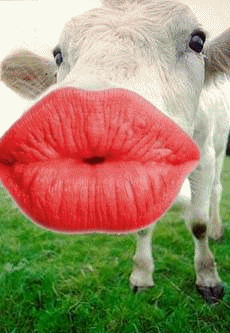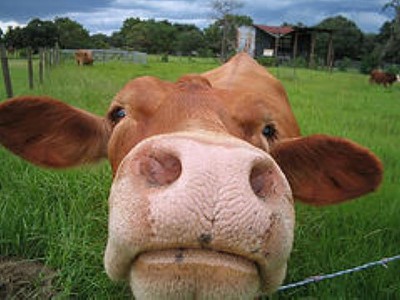In 2004, I spent a week at a cottage with a couple of my children in Eastern Ontario near Sandbanks Provincial Park on Lake Ontario. Lovely spot.
 One rainy day, we toured around and ended up at a cheese shop. They produced the cheese in the factory at the back, and had a charming market outlet that seemed to trap tourists like bees on sap.
One rainy day, we toured around and ended up at a cheese shop. They produced the cheese in the factory at the back, and had a charming market outlet that seemed to trap tourists like bees on sap.
Upon entering the store, a sign declared, “HACCP – A food safety program; Hazard Analysis Critical Control Pont.” Cool. I asked one of the staff what it meant. She said she didn’t know.
But beside the HACCP proclamation was a sign that read, “Public bathroom is out of order; for your convenience there is a blue Johnny on the spot behind the building (sic).”
 And here it is (left). Note the lack of handwashing facilities or sanitizer. I watched people go to the porta potty and then come into the cheese shop and do what people do at quaint cheese shops: stick their unwashed hands into shared samples of curds (that’s one of my daughters looking disgusted in the middle, right, not because of the practice, but because I have to take pictures and be a food safety geek everywhere we go).
And here it is (left). Note the lack of handwashing facilities or sanitizer. I watched people go to the porta potty and then come into the cheese shop and do what people do at quaint cheese shops: stick their unwashed hands into shared samples of curds (that’s one of my daughters looking disgusted in the middle, right, not because of the practice, but because I have to take pictures and be a food safety geek everywhere we go).
HACCP really doesn’t mean much unless there is a culture of food safety amongst the employees and everyone involved in making a product, like cheese or deli meat.
Best as I can figure, there is a separate outbreak of listeria in Quebec, in which one has died and 14 have been sickened. Eleven different types of cheese have been recalled, and many of them appear to be raw milk cheese, which the Quebec government recently approved for sale.
 While merchants are complaining about the crackdown and lost sales, what seems to have been lost in the coverage is that seven pregnant women – four confirmed, three suspected – have developed listeriosis and three gave birth prematurely.
While merchants are complaining about the crackdown and lost sales, what seems to have been lost in the coverage is that seven pregnant women – four confirmed, three suspected – have developed listeriosis and three gave birth prematurely.
Sylvie Thibault, a customer sampling some of the free cheeses at La Fromagerie Atwater yesterday, said she’s not worried, stating,
"I have started to double-check what cheese I buy. But I won’t stop eating the food I love because of a little scare."
Joe Schwarcz, director of McGill University’s Office for Science and Society, said,
"We need to put this in perspective," adding it’s important "not to have people think every time they bite into a piece of brie, they’re risking death."
Wow. I wouldn’t want to be pregnant in Quebec. So, Quebec government (Canada has no real authority in Quebec), given the number of pregnant women who have been sickened, any efforts to highlight the risks of listeria in certain foods to at-risk populations? Or is it just a silly little scare?
The recalled products from Fromagerie Medard are: Le Rang des Iles, Le 14 Arpents, Les Petits Vieux, Le Gedeon, Le Medard, Le Couventine, Le Cabrouet and Les Cailles, all with best-before dates between July 12 and Sept. 6. Products pulled off shelves from Fromagerie Table Ronde are: Le Fleurdelyse, Le Fou de Roi and Le Rassembleu with best-before dates after July 14.
Last week, cheeses manufactured by Fromages La Chaudiere were recalled because of salmonella, blamed for the death of an elderly person in the Chaudiere Appalaches region and 90 illnesses across Quebec.
.gif) Schmidt’s raw-milk operation may be the most sparkling-clean in all of Ontario. His methods of storage and transport may be beyond reproach. His milk cows may be grass-fed, free-range, pest-free and of above average intelligence. For all we know they may produce wonderful abstract-expressionist paintings in their off hours.
Schmidt’s raw-milk operation may be the most sparkling-clean in all of Ontario. His methods of storage and transport may be beyond reproach. His milk cows may be grass-fed, free-range, pest-free and of above average intelligence. For all we know they may produce wonderful abstract-expressionist paintings in their off hours.
 But we’re all experts cause we all eat.
But we’re all experts cause we all eat.  Michael Schmidt has run a co-operative organic dairy farm near Owen Sound, Ont., for more than 20 years.
Michael Schmidt has run a co-operative organic dairy farm near Owen Sound, Ont., for more than 20 years. "We didn’t find any other common exposure. It’s strong evidence, but it’s not conclusive. It’s still not absolute proof because we didn’t get a hold of any of the raw milk to test."
"We didn’t find any other common exposure. It’s strong evidence, but it’s not conclusive. It’s still not absolute proof because we didn’t get a hold of any of the raw milk to test." “This bill weakens food safety standards in California, something I cannot support. … Looking past the lobbying techniques, public relations campaign, and legal maneuvering in the courts, one conclusion is inescapably clear: the standard in place has kept harmful products off the shelves and California’s raw milk dairies have been operating successfully under it for the entirety of 2008.
“This bill weakens food safety standards in California, something I cannot support. … Looking past the lobbying techniques, public relations campaign, and legal maneuvering in the courts, one conclusion is inescapably clear: the standard in place has kept harmful products off the shelves and California’s raw milk dairies have been operating successfully under it for the entirety of 2008.  At least that’s what the
At least that’s what the .jpg)
.jpeg) Mansel Griffiths, a dairy microbiologist at the University of Guelph
Mansel Griffiths, a dairy microbiologist at the University of Guelph